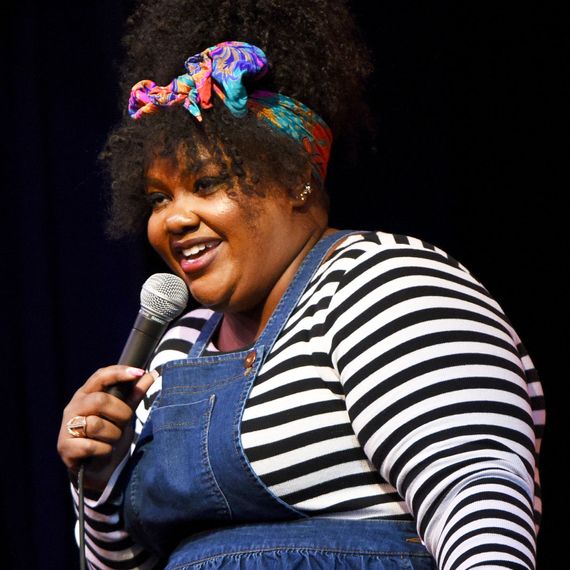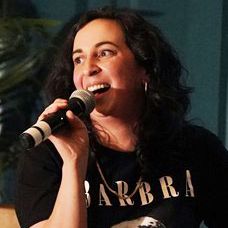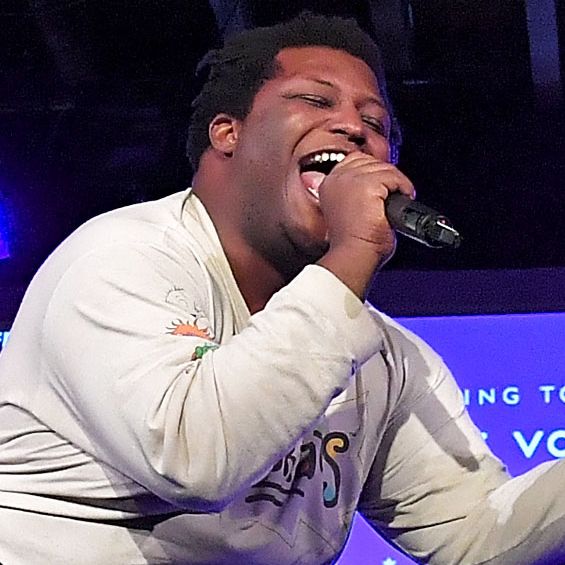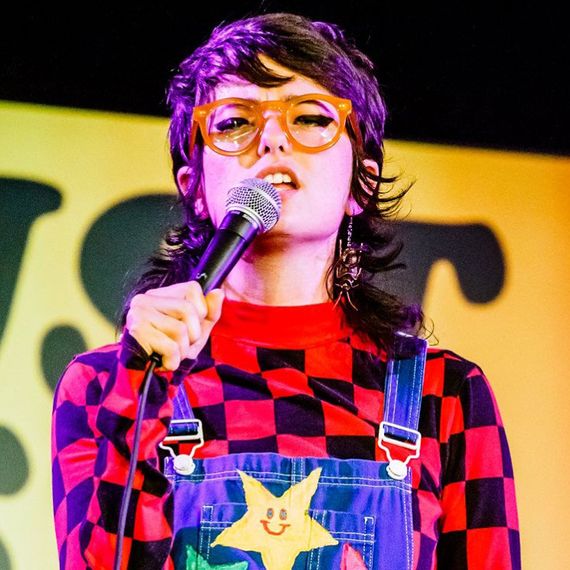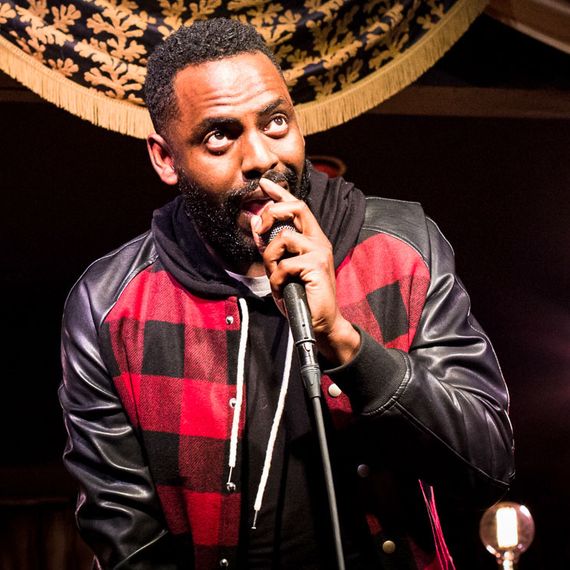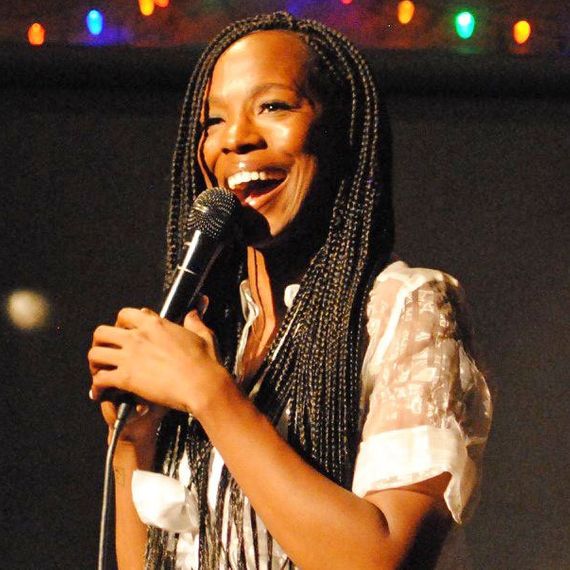
Stand-up comedy is an interactive art form. Every joke is a strange alchemy of comedian, audience, the background hum of current events, and any number of other factors completely out of anyone’s control. Jokes that seem surefire in the comic’s head can fizzle once they’re actually told. But conversely, jokes that comics were sure wouldn’t work can kill. Ahead of the New York Comedy Festival happening next week, Vulture spoke with 15 comedians performing at this year’s event about their logic-defying joke — the one they thought was for no one and turned out to be for everyone. From mortality to musical theater, these comedians shared the topics they thought no one else would care about, and what they learned from being wrong.
Nate Bargatze
Iced coffee with milk. I was surprised that it became as big as it did. After I did The Standups, that was the one people were talking to me about. It’s not that crazy; Starbucks messes up everybody’s drinks. I didn’t think it would hit the way it did. It really struck a chord. Sometimes the most obvious ones — that you could be a little worried about being too obvious — hit a perfect point. Enough people have dealt with it, but haven’t worded it a certain way. In The Standups, the “iced coffee with milk” joke is in the middle. And then on The Tennessee Kid, I close with the new version of it. That’s how much it took off. You have to put [the biggest joke] at the end. It was just sticking out, how hard it was hitting. And you get excited to get to it. Once it starts hitting harder, it gets more fun to tell.
You’ve got to trust that you’re normal. I always say that I’m the most average person. My taste is descriptive of America, what I’m into: sports, chain restaurants. Over time, you just learn, If I’m doing this, then I bet other people are, too.
Nicole Byer
I wrote a dick joke that devolved into an abortion joke. The first time I told it was in L.A., and it got a great response because I was preaching to the choir. But when I started telling it [while touring], I was so scared because people hated it: “This is such a visceral joke! We hate it!” and I was like, Oh no! I just reworked the end of it, and now people really like it. I didn’t really change it; I just added a call to donate to Planned Parenthood. Because then it almost guilts them into liking it. It was one of those things where I wasn’t going to say sorry. It’s a super-visceral joke, and me doubling down and saying “I’m not sorry, this could be someone’s reality” was the way out.
But there is something to tailoring jokes to different people. When I was in Canada, I have a joke about Target. They don’t have Targets in Canada. I asked the people of Canada, “What’s your relationship to Target?” And they were like, “It came, and they didn’t do it right, so then it left.” So I just added a little chunk of that to the joke, and I made people think, Oh, wow, she knows a little bit about us! It was like a 30-minute rant about how they are wrong. [Laughs.]
Karen Chee
The joke that I was worried about was actually just a sentence: “White people are very interesting because they’re allowed to be.” And I’ve noticed that the joke works if I pause long enough after that sentence is over, as if I’m going to say something. Then I just go onto the next thing, and that’s when it gets the laugh. I talk pretty quickly most of the time in real life, and pausing is something that’s very new to me, and something I had to learn onstage. That was very, very scary for me. Often, in the middle of the pause I’d be thinking, Maybe this isn’t going to work, and this is just going to be a very long silence.
I feel like a lot of my set is making fun of men, and white people, and white men to their faces, and sort of giggling my way out of it. Being like, “You still like me, I hope!” And so this one, as long as I haven’t ostracized the audience or gone too mean, it goes well. If the audience trusts me, the laugh comes faster. And if they don’t, I really have to stay in that pause for longer. I hope it makes certain people uncomfortable in the right way.
Catherine Cohen
Lately, I just start all my shows by singing the word “Hello!” really loudly, and then I say, “Wow, I have an amazing voice.” And I was really nervous because I hadn’t done any singing in my act, it was just stand-up. But I missed singing. I grew up doing musical theater, and when I started doing comedy I think people thought [my background] was kind of lame, and I was sort of ashamed of it. But ultimately, leaning into that background actually turned my act into what I’m most proud of today. It was bold and big, whereas a lot of stand-up I’d seen when I first started was sort of deadpan and small. So I was scared to be big and feminine and loud. I worried it would be annoying, but people responded to it. That little bit of positive feedback gave me the confidence to lean further into my musical side, and that inspired me to keep writing songs. And songs are what most of my act is now. That’s where I found my voice. It singles you out, and that’s ultimately what you need. But it is scary when you’re a nobody doing open mics, to call attention to yourself.
You just have to lean into what feels good. Follow that impulse. If you’re trying to write a certain type of way, and it always feels painful, maybe it’s not the right thing. Writing a song was always easy to me, whereas jokes felt harder. Now that I can think about jokes as songs or poems, things flow much more naturally.
Jo Firestone
Five or six years ago, I had this idea for an impression of a dolphin that had one wish, and the wish was to become a human. Basically, the joke was that the dolphin was pretty excited to have knees. This was before comedians were really doing smart stuff. It was a time of dumb stuff, I would say. And I thought that was going to be a hit, and it was almost never a hit. But then one time, Joe Pera bet me that if he did it, he could do it right. So we both tried it at the same show. I even went first, so it would be pretty clear that he was stealing my joke. He did it after me, and he pretty much crushed it. He did it exactly the same. We tried it again, where he just did it, and it crushed again. It turned out maybe it just needed a man’s delivery.
Jena Friedman
There’s this tag I did on my Conan set, about Jeff Epstein, that I was nervous about. The audience’s reaction was always different to it. And so, maybe half an hour before taping, I still couldn’t figure it out. The joke is about Ted Bundy, and how it’s not easy to ghost someone from prison unless you’re Jeffrey Epstein. People would groan. And so I had another line, “If it makes you guys feel better, he didn’t kill himself.” Which isn’t a joke, but it worked.
Confidence is almost more important sometimes, in a way that is scary. If people trust that you are coming from a place of empathy, they’ll go along with you on a journey. A lot of the stuff I joke about comes from things I’m scared of to begin with. Finding comedy around them helps me cope with them. I think we’re in a moment that’s pretty sad in a lot of ways, and a lot of people are more onboard than they were a few years ago. It helps me push it further.
Sudi Green
I used to do Christiane Amanpour in the Middle East, adjusting her veil and being worried about how many inches of her hairline she was showing and whether it was slutty or not. I’ve always noticed that female journalist in a Middle Eastern country. And all of a sudden you see her in this veil. Is it open? Is it closed? How far over her bangs is it? The first time I did it, I didn’t think anybody would get it. It was a very small observation that I made. People got it, and it was very surprising.
It taught me that if I have noticed something, probably somebody else has, even if they haven’t articulated it. I think that if you play to what you think everybody can relate to, you’re just going to wind up making Pinterest comedy — reposting an idea that someone else has already had. Whether I’m writing for myself, or writing for a show, you don’t want to think necessarily about what this audience is going to love. Then you get into this danger zone of making something less specific, or less unique, or less interesting. You could write something that is out of the box, and it could completely fall on its face. But if it’s a success, you’ve done this completely new thing. So the reward is much bigger than the risk.
Kathleen Madigan
I do a big thing about the Villages on my last special. There’s a place in Florida called the Villages. It’s a 55-and-older place that my parents tried to scam three years in a row. Everything I say in that bit is true. But in the middle of it, I decided to insert a scene from The Sound of Music, and I was a little worried that no one else would get that. My sister and I are a little obsessed with The Sound of Music. I didn’t really think people would be onboard; I just wanted to do it. But then it super-duper worked. It was shocking. I was really just sneaking it in for my own amusement — really for my sister because she kind of dared me.
I learned I can be sillier if I want to. I don’t have to worry about Is this going to be good for everybody in the room? There’s a Midwest work ethic that I run around with: I am getting paid to make people laugh. When someone hands me money, I feel like I should have done what I promised to do. So I never want to get too weird. Other people feel it’s an art. I feel like it’s an art to a point, but once you’re getting paid, it’s commissioned. You’ve been paid for, so in my opinion, you need to do the job. But now I know I can be a little sillier, and there’s no harm, no foul.
Atsuko Okatsuka
I have this joke where I randomly explain that I’m half-Japanese and half-Taiwanese … That’s why I look Korean. Initially, I didn’t get why the joke worked. But now I know why. With a joke, you create tension and then you release it. There’s tension in bringing up race. But people always want to know where you’re from. So it’s me playing around with it. I’m going to tell you, but I say it kind of out of nowhere, so there’s a little tension: Oh shit, why is she bringing up race? Then I say, “I’m half-Japanese, half-Taiwanese,” dot, dot, dot, tension, “that’s why I look Korean.” And it’s so absurd. It’s this whole thing of See, you shouldn’t have assumed because now we’re all confused again. Some people start nodding when I say I’m half-Japanese and half-Taiwanese like, Yup, I thought so! And then I take it away from them again. It’s worked in all kinds of audiences, even with Asian audiences. They understand that it’s hard to “tell.” Like, what does that even mean, to look a certain way?
More and more, I’ve learned that it comes down to confidence. You might think you’re niche; you might not think you’re for everyone. But if you’re confident in your joke-writing technique, it’s actually more relatable than you think. That tiny one-sentence joke came about at a time when I was realizing that. I was traveling and doing shows in places that I’d never even heard of in the United States. For that particular joke to work in, like, Wilmington, North Carolina, speaks to that. It’s about trusting that, within your truth, there’s a lot who people have experienced that as well. Sometimes the more specific you get, the more relatable it is.
Larry Owens
Originally, I had all these reservations about wearing wigs in my act. I knew in my character work there was this lane that I wanted to explore because I actually revere women. I honor them. I wanted to, as a queer person, bring their stories into my storytelling. So, against this sense of tradition and my own feelings, I’ve done these bits with Viola Davis and Oprah Winfrey that I think are good bits. They work. I have to be so rigorous in the writing, to make sure the joke is always pointed at the system. It’s about making these women funny in the moment in time and not This is a respectable woman behaving badly. But I think the audiences are willing to listen. I decided to do some of the bits without the wig, and it doesn’t work. So I think there’s some weird, queer science about wearing a wig as well.
Just because something doesn’t work for somebody else doesn’t mean it won’t work for you. I understand a straight-identifying black male comedian balking at this idea, but for me, I don’t think there’s anything wrong with gender variance. I don’t think there’s anything lesser-than about wearing a wig or assuming a female form. I have to be very clear about what structures existed before me and why they existed, and also my place as a young comic to push past those things.
Pat Regan
I do a treatment of a fake teen rom-com. It’s a three- to four-minute bit, and I never thought I would do it onstage. It started because I got a stress fracture in my foot and I couldn’t walk for two weeks. So I was lying on my couch, watching Netflix, and I did an Instagram Story about being bedridden. I improvised into Instagram Stories about a cool girl who gets bedridden, and then this nerd with a secretly good body has to come over and bring her trig homework. Ultimately, they fall in love and she wins prom queen. There were lots of trope-y high-school specifics in it. I never thought I would do it live. But then I was doing this longish set at Outside Lands last summer, and I wanted to really kill. I was like, It’s a festival audience, and it’s a long bit. I don’t know if they’ll be along for the ride. But as a last-minute decision, I did it, and it slaughtered. It felt so good. That was in August, and from then until this February I did it every show I had when I had more than ten minutes. Now I’m sick of it.
I never thought it would be a hit, but it’s my most successful bit. I didn’t think it would work because it was so long, and it’s so niche. It’s so specific to my humor. It’s mostly about how teens talk in media, as opposed to how humans talk in real life. It doesn’t start with a huge laugh. I always know when it’s going to get its first laugh and it’s truly 45 seconds into the bit. I’m always shocked when I still have time to get to that laugh. It’s honestly scary every single time. I feel a weird guilt around it. As a comedian, if you’re not making people laugh every five seconds, you feel guilty over it. So I feel weird shame if I do something slow. I have to calm myself down a little bit.
Sometimes I don’t know if I’m considered an alt comedian or a regular comedian. I definitely do stand-up and do jokey jokes. But if I ever showcase, they always split you up into “stand-up” or “characters.” Most of my friends get put in “characters,” and I’m in the “stand-up.” So I always get paired with these straight guys who I’ve never met in my life and who get up at the Cellar a lot. They all kill, but they’re so set up, joke; set up, joke; set up, joke. And that bit is the antithesis of that. I’m going to do a four-minute fake movie treatment that I think is funny, and there’s no specific joke in it. It taught me that people are down to go with you on a little journey, and to trust your gut. I can be patient and I can do a slow build. It doesn’t make me less of a comedian. I can get just as big of a laugh as those Comedy Cellar setup–punch line people.
Brendan Scannell
I’ve got this whole bit about being catcalled for being redheaded. If I walk by anyone of an older generation, people will tell me I have beautiful hair. Like one time, I was in my neighborhood in Los Angeles, a woman pulled up in her BMW next to me and screamed, “You should be wearing a hat!” Another time, I was walking in Chicago and a woman in coke-bottle glasses came up to me and asked, “Excuse me, is your name Connor?” And I said it wasn’t, and she said, “Oh, 25 years ago, my daughter gave away a redheaded child named Connor.” She expects every redhead to be her lost grandson. I didn’t really expect people to understand that this was a reality I faced every day of my damn life. But that’s what’s great about identity-based comedy. I’m able to express my redhead identity for people who don’t have that experience.
There’s this certain type of comedy that you do when you first start out: “I look like” comedy. You hear people’s specials, and it’s really effective. The minute you see [a comic], you’re trying to figure out who they are. So coming right off the bat, and pointing that stuff out in fun ways, is a touchstone of comedy. But since it’s been done so much, it has to be done in new, creative ways.
Sarah Squirm
I really do feel like every time I try something, it could go so horribly. The last thing I made was a PowerPoint performance about Bernie Sanders. The whole running joke of the entire piece is just repeating the same joke over and over again, which is, “If you’re not voting for Bernie Sanders, is that because [you’re dumb]?” If you’re not voting for Bernie Sanders, is that because if I unscrew the top of your skull, your brain is just a big ass that’s just exploding diarrhea in a chocolate fountain? And the video is me with a handmade papier-mâché skull I made, unscrewing the top of the head. And there’s just a big pink butt with chocolate syrup fountaining out the top of it. Repeating the same joke over and over again, it’s slightly polarizing. It’s basically an accusation. They’re so elaborate, and so prop-heavy, and with so much repetition. So if this one joke doesn’t go over well up top, it’s 12 minutes of the same joke over and over again with high production and a lot of open buttholes.
Getting any reaction at all is fun. It’s either they’re laughing, and we’re all full of joy and having a good time, or people are screaming because there’s a butthole that’s exploding shit. Not getting a reaction at all is the worst — people just sitting there with their arms crossed. But if people are screaming in horror or laughing, then, hey! That’s a day’s work.
When people are laughing, it enables my worst behavior. It’s only going to enable me to make something worse next time. I did a PowerPoint where I made a big vagina out of raw meat, and people were laughing at it. So of course my next PowerPoint, I did a more grotesque and horrifying version of it. If people keep enabling my worst behavior, hopefully I’ll make the grossest thing yet.
Baron Vaughn
There is a joke that was born out of [shooting] a weird interview series with editors and filmmakers. I was in a small room with these people for a full day. It was a sound guy and a camera guy. And the sound guy told this story about filming a commercial in the desert. There were a lot of poisonous snakes, so they had to get the snake handler to come and manage the snakes. And he said, “The guy walked around with a stick and a bucket.” And then [the sound guy] got a call and walked away. You can’t tell me the first part of a story and walk away before you’re finish, or I will obsess about it for the rest of my life. I am stuck trying out other endings for this story forever. The bit devolves into a song called “Snakey Go Away.” It’s so theatrical, and it’s a paper-thin premise.
I don’t do it that much because you have to really like me. You have to really be onboard for everything else you’ve seen for this bit to work, because it’s a very long bit, it’s a very involved bit, and it devolves into a song and a rap. It becomes a bit within a bit, where I get lost in the fantasy of a fantasy. But there have been times where I was having a set and it wasn’t going well, and I’ve decided to do this bit as a punishment to the audience: Oh, you didn’t like me? Well, you’re going to get all of me.
Sydnee Washington
I’m pretty morbid right now, and I’m always worrying about Hey, is this too dark? I have a joke about being too poor to die. I don’t even have cremation money. So if there’s a fire, just leave me there, that’s a free cremation. I’m trying to die on a budget. People respond to it because you would think cremation is cheap, but it’s not. It’s like $5,000. People understand where I’m coming from with that. Knowing how much money it costs to die is a thing. Knowing how much a funeral costs, no matter who you are, people are like, I don’t have enough money for that.
[The response has taught me] I’m not the only one that’s weird. Not weird, but I’m not the only person who thinks about death in a different way. Because of the internet, and because people are always putting out their weird ideas on Twitter and Instagram, nothing is off-limits. Nothing is too strange.




